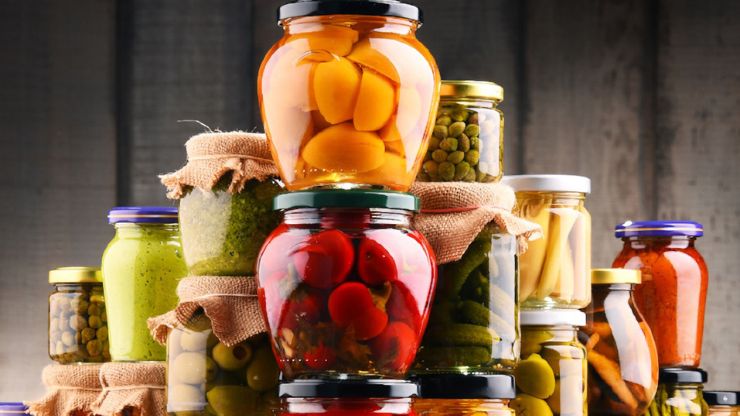How to Safely Store Fermented Foods – Fermenting foods has emerged as a timeless practice that not only enhances flavor but also promotes gut health and boosts nutritional value. Delve into the reasons why fermentation has become a culinary trend, and discover the safest techniques for preserving these beneficial foods.
Table of Contents
ToggleWhy Ferment?
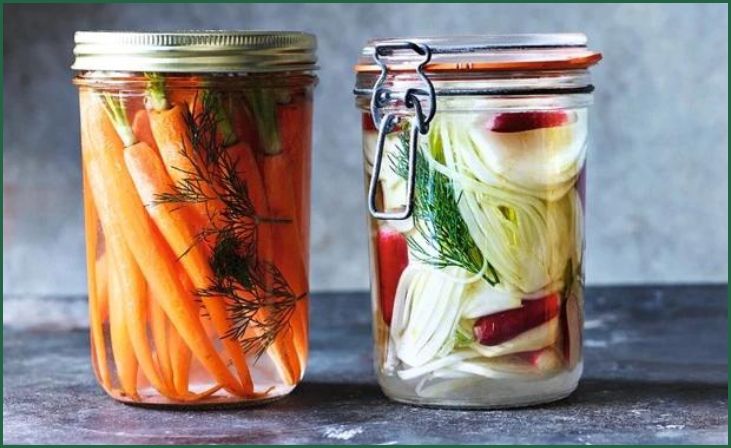
Before learning How to Safely Store Fermented Foods, you must understand why you must ferment your food. Fermentation, an ancient culinary technique, has garnered significant attention in recent years due to its multitude of benefits, ranging from enhancing flavors to bolstering the nutritional profile of various foods. This transformative process involves the breakdown of carbohydrates by microorganisms such as bacteria, yeast, or fungi.
Through this metabolic process, sugars are converted into organic acids or alcohol, leading to the development of complex and unique flavors that can tantalize the taste buds. This extraordinary transformation not only provides a gastronomic adventure but also contributes to the preservation and enrichment of the food being fermented.
One of the key reasons why fermentation has become a cherished practice is its ability to amplify the nutritional value of the foods being fermented. During fermentation, the microorganisms produce enzymes and vitamins, including B vitamins and vitamin K2, which enhance the overall nutrient content of the food.
Also Read: Pickling versus Fermenting
Moreover, the process also generates probiotics, which are beneficial bacteria known for promoting gut health. These probiotics aid in the digestion and absorption of nutrients, thereby supporting overall digestive well-being. Incorporating fermented foods into one’s diet can thus contribute to a more robust immune system and improved overall health.
Furthermore, the practice of fermenting foods offers an avenue for exploring diverse and intense flavors that are not commonly found in non-fermented foods. The introduction of fermentation introduces a spectrum of tangy, sour, and sometimes even umami-rich profiles, which can significantly enrich the culinary experience.
From the pungent notes of kimchi to the savory tang of sauerkraut, fermented foods offer a sensory journey that can elevate the enjoyment of various dishes. This aspect has led to a resurgence of interest among food enthusiasts and chefs, who are continually experimenting with different fermentation techniques to create novel and delightful flavor combinations.
Moreover, the art of fermentation serves as a method of food preservation, allowing perishable items to be stored for extended periods without compromising their nutritional quality. By creating an acidic environment through fermentation, harmful bacteria are inhibited, preventing spoilage and extending the shelf life of the food.
This traditional preservation method has proven to be a valuable technique in preserving seasonal produce, reducing food waste, and ensuring a more sustainable approach to food consumption. As a result, fermentation has not only become a culinary trend but also a sustainable practice that aligns with the ethos of reducing environmental impact and promoting food security.
How to Safely Store Fermented Foods? 10 Tips
Choose the Right Container
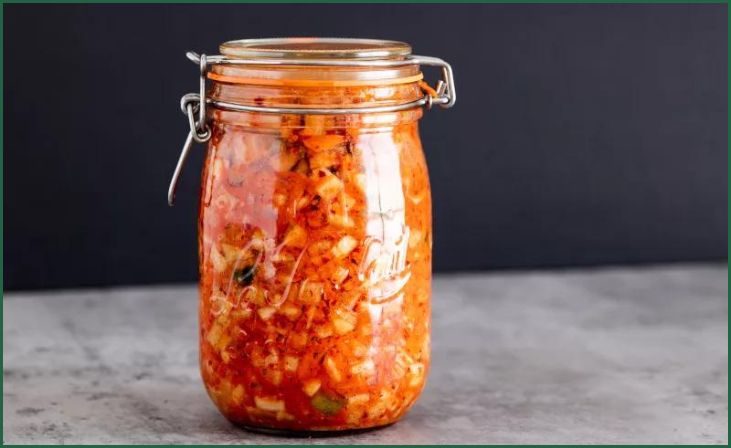
Choosing the Right Container for storing fermented foods is a crucial step in preserving their quality and taste. Glass or ceramic containers with airtight lids serve as ideal options, as they prevent the absorption of unwanted flavors or chemicals from other containers. These materials also create an airtight environment, which is essential for preserving the freshness and integrity of the fermented foods over an extended period. This is the first tip on our list of 10 best tips on How to Safely Store Fermented Foods.
Maintain a Consistent Temperature
Maintaining a Consistent Temperature is paramount to prevent the growth of harmful bacteria that can lead to spoilage. Fluctuating temperatures can compromise the quality and safety of the fermented foods. Aim for a temperature range between 32°F to 50°F, as this range provides an optimal environment for slowing down the fermentation process, ensuring that the flavors develop steadily without risking over-fermentation. This is the second tip on our list of 10 best tips on How to Safely Store Fermented Foods.
Protect from Light
To Protect from Light, it is crucial to shield fermented foods from direct sunlight or artificial light, as exposure to light can degrade their quality. Storing them in a dark place or using opaque containers effectively preserves their texture, flavor, and nutritional content, ensuring that they retain their original characteristics for a longer duration. This is the third tip on our list of 10 best tips on How to Safely Store Fermented Foods.
Keep Moisture Levels in Check
Keeping Moisture Levels in Check is vital to prevent the formation of a breeding ground for harmful bacteria, which can lead to mold growth and spoilage. Before storing fermented foods, ensure that the containers are thoroughly dried, and avoid exposing them to excessive humidity, as this can compromise their safety and longevity. This is the fourth tip on our list of 10 best tips on How to Safely Store Fermented Foods.
Also Read: Fermentation Gift Basket
Monitor for Spoilage Signs
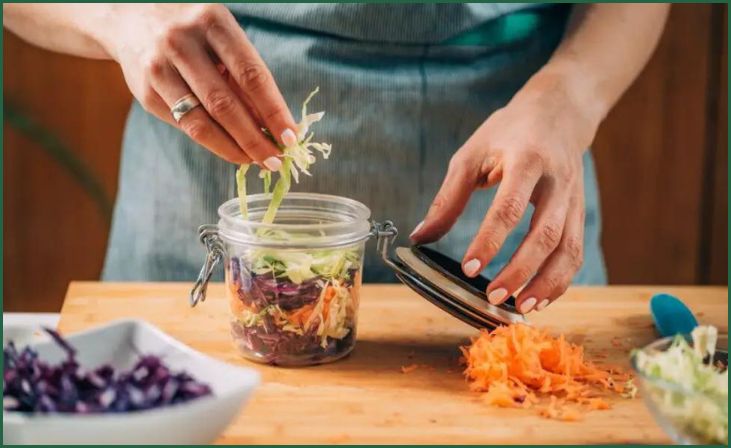
Regularly Monitoring for Spoilage Signs is crucial in maintaining the safety and quality of fermented foods. Keep an eye out for any signs of spoilage, such as mold growth, off-putting odors, or unusual texture. Promptly discard any items that exhibit these signs to prevent the risk of foodborne illnesses and to ensure that the remaining batches remain safe for consumption. This is the fifth tip on our list of 10 best tips on How to Safely Store Fermented Foods.
Don't just scroll, subscribe!
BuzzTrail's unique web-stories are the cure for boredom you've been waiting for.
Use Food-Grade Seals
Ensuring that the containers used for fermentation have Food-Grade Seals is essential for maintaining an airtight environment that protects the fermented foods from contamination. It is important to check that fermentation crocks or jars come with high-quality seals and to replace any worn-out or damaged seals promptly. This practice prevents air exposure, which can lead to the growth of harmful bacteria and compromise the safety and quality of the fermented products. This is the sixth tip on our list of 10 best tips on How to Safely Store Fermented Foods.
Store Away from Strong Odors
To Preserve Original Flavors, it is crucial to store fermented foods away from strong odors. These foods can readily absorb strong odors from their surroundings, affecting their taste and aroma. Keep them away from pungent substances such as spices, cleaning agents, or other strong-smelling foods to ensure that they maintain their distinctive flavors and aromas, allowing their unique fermentation profiles to shine through. This is the seventh tip on our list of 10 best tips on How to Safely Store Fermented Foods.
Label with Date
Labeling each container with the Date of Preparation is a simple yet effective practice to keep track of the freshness and shelf life of fermented foods. This approach ensures that you consume them within a reasonable timeframe and helps you identify any batches that may have exceeded their recommended storage period. By adhering to a clear labeling system, you can confidently manage the rotation of your fermented products and maintain their optimal quality and safety. This is the eighth tip on our list of 10 best tips on How to Safely Store Fermented Foods.
Refrigerate if Necessary
Refrigeration may be necessary for certain types of fermented foods to maintain their freshness and safety. While some fermented foods can be stored at room temperature, others, such as certain types of pickles or fermented dairy products, require refrigeration. Consulting specific recipes or guidelines is crucial to determine the ideal storage temperature for each type of fermented food, ensuring that they remain safe for consumption and retain their desired flavors and textures. This is the ninth tip on our list of 10 best tips on How to Safely Store Fermented Foods.
Practice Proper Hygiene
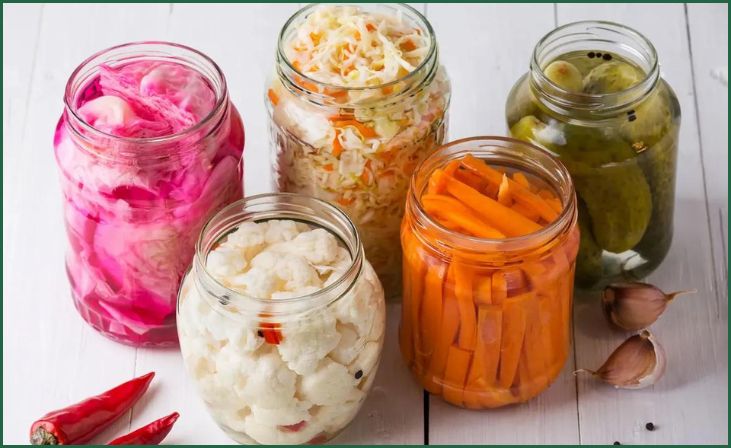
Practicing Proper Hygiene during the handling and storage of fermented foods is essential for ensuring their safety and quality. Thoroughly washing your hands before handling the containers and ensuring that the storage area is clean and free of any potential contaminants can help prevent the growth of harmful bacteria. By prioritizing hygiene, you can maintain the integrity of your fermented delicacies and enjoy them with confidence. This is the tenth tip on our list of 10 best tips on How to Safely Store Fermented Foods.
Also Read: How Does Lacto Fermentation Work
How Long Can You Leave Your Fermented Foods?
The length of time fermented foods can be left to ferment depends on various factors, including the type of food being fermented, the specific fermentation process employed, and the desired flavor profile. Different fermented foods have different fermentation periods, ranging from a few days to several weeks or even months.
The duration of fermentation significantly influences the taste, texture, and overall quality of the final product. While some fermented foods may develop complex flavors and textures over an extended period, others might become overly acidic or lose their desirable qualities if left for too long.
For instance, some quick-fermented vegetables like sauerkraut or pickles can be ready within a few days to a week, achieving a mild tanginess and crunch. On the other hand, certain traditional fermented foods like kimchi or miso require several weeks to months to develop their characteristic robust and tangy flavors. These longer fermentation periods allow for the growth of specific strains of bacteria or yeast that contribute to the unique taste and texture of these foods.
It’s crucial to follow specific recipes or guidelines for each type of fermented food to ensure the optimal fermentation time. Over-fermentation can lead to a sour or overly acidic taste, potentially rendering the food unpalatable.
In contrast, under-fermentation might result in an incomplete development of flavors and textures, failing to achieve the desired taste profile. Monitoring the fermentation process through regular taste tests and visual inspections is essential to determine the ideal fermentation duration for each batch of fermented foods.
Moreover, the environmental conditions, such as temperature, humidity, and air quality, can also affect the fermentation process and its duration. Warmer temperatures generally accelerate the fermentation process, while cooler temperatures slow it down. Factors like the presence of oxygen or exposure to light can also impact the fermentation process, potentially altering the taste and quality of the final product.
In summary, understanding the specific requirements of each fermented food, closely monitoring the fermentation process, and maintaining optimal environmental conditions are key factors in determining the appropriate duration for fermenting foods. By carefully adhering to these guidelines, you can achieve the desired flavors, textures, and nutritional benefits while ensuring the safety and quality of your fermented creations.
Also Read: Foods You Didn’t Know Were Fermented
Conclusion
In the realm of culinary arts, the process of fermenting foods has proven to be a transformative journey. By harnessing the power of beneficial bacteria, we not only enrich the flavors of our dishes but also cultivate a treasure trove of health benefits. With careful attention to safety measures, the art of fermenting can be a rewarding and nourishing experience, enriching both our palates and well-being.
FAQs
Why should I consider fermenting foods?
Why should I consider fermenting foods?
Fermenting foods not only enhances their taste but also increases their nutritional value by introducing probiotics that support gut health. Moreover, it offers an opportunity to explore a spectrum of unique flavors that can elevate your culinary experience.
How can I safely store fermented foods?
How can I safely store fermented foods?
To ensure the longevity of your fermented creations, it’s crucial to store them in airtight containers in a cool, dark place. Refrigeration can also extend their shelf life. Regularly inspect the containers for any signs of spoilage and discard any items that appear to have gone bad.

